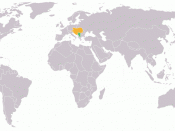Some events in history are left unanswered. Historians tend to solve these mysteries by asking what if questions. The problem is finding the best scenario. In the end many theories are developed, but that leads to the discussion of which theory or theories is the best explanation. Could one man and his decisions have been the cause? Perhaps an additional alliance with a country may have resulted in a different outcome in the War? France fell behind economically after the First World War, and some say weren't ready for another costly war. France's reputation of being one of the most powerful countries was diminished with her fall to the Germans in the beginning of the 2nd World War. France's great defeat originated from the inept ability of the French government to form an alliance with the Russian-Soviets, which consequently led to poor strategic planning with the early allies.
France began its defensive strategy in 1930 with the construction of the Maginot Line.
Complete construction was finished in 1939 with an estimated cost of 240 million dollars, approximately twice the amount that was originally estimated.(Kaufmann, The Maginot Line, page 7) The line consisted of fortifications along the eastern border of France between Switzerland and Belgium. With this stretch of land, military leaders needed to devise a plan that would be most effective in dispersing their French and allied soldiers. Further planning needed to be made concerning the cooperation of Allied forces. Theres no doubt France needed the help from other countries, but actions made by some countries had France biting the bullet on its own.
Russia's role in World War I was imperative to the French victory. Soviet Russia was effective in averting some of Germany's attention from the west. The years following Word War I, international relations between France and its allies toward Russia were thinning. Russia was struck with a revolution and a Civil War. Many countries saw a chance for independence, Poland being one of them. Poland gained its independence and went about creating its borders. Poland was not left alone for long. A revolution to spread worldwide communism was right at Poland's doorstep. The Red Army needed to invade Poland in order to establish communist communities in Western Europe. The fight began and the Polish Army was forced westward. An unexpected victory by Poland pushed Soviet forces eastward out of Poland. A peace treaty was later signed to divide the territories (Dreifort, The Franco-Soviet Pact.) The Polish-Russian War deterred any alliance between Western Europe and Russia in the future for some years.
In the mid 1930's a high priority for France was to develop a positive agreement with Russia. World War I emphasized to France the importance of a Soviet ally, and was willing to reestablish a relationship. A non-aggression pact between France and Russia seemed only beneficial if Poland and Romania, already allies with France, sign the pact as well. France did not want to jeopardize their alliance with Poland and other eastern countries, without the consent of the allies. Poland and Romania ultimately formed a non-aggression pact with the Soviets. Russia, rather than just a non-aggression pact, felt more inclined to the idea of an alliance with France (Scott, Alliance against Hitler, pages 11-18). This gives the responsibility of both countries to come to the aid of one another. Major interest for this alliance came solely from Russia. France's main interest was for the tension between Russia and Germany to lessen the tension between France and Germany. France brought up the idea of Russia joining the League of Nations. This would allow Russia to use the territories of Poland and Romania to transport troops. A French politician, Louis Barthou said, "I considerâ¦that the entry of Russia into the League of Nations should be an eminent event for the peace of Europeâ¦that the policy of France tends toward a sincere rapprochement with Russia (Scott, Alliance against Hitler p. 169)." Soviets agreed to send military aid to France and France's other ally, Czechoslovakia, if there was any German aggression. Earlier unrest between Poland, Romania and Soviet Russia during the revolution and civil war, would not allow Russia to cross through their territory (Dreifort, The Franco-Soviet Pact.) The Polish government did not want the Red Army on their land as before. If the use of Poland and Rumania as a passage way was declined, then Russia was willing to send troops by sea and send air support. Then again France's obligation, would be to send aid if Russia is threatened by Japan or other eastern countries. France's reply was that they would need every resource possible. If France were to avoid the initial attack from Germany, then France would plan on responding offensively. France wanted to use their resources solely against Germany. Russia agreed to France's terms. Churchill responded, "Once more, the Russians took the initiative in giving life to their alliance with us!" France still felt uncomfortable due to the pressure of the anti-communist groups in France. Unfortunately, an alliance was not made because the possible rise of French communism(Scott, Alliance against Hitler p. 262-265) An alliance with Soviet Russia may have been the answer France was looking for. Even without the cooperation of Poland and Rumania towards the Soviets, Russia attempted to make the alliance as appealing as possible to the French. France's objective of using the Russian army to slow down Germany and then to attack Germany did not sound appealing to the Soviets. Russia did the next best thing, well at least for the time being, and signed a non-aggression pact with Germany in August of 1939 (The Encyclopedia of World War 2, 576.) This added confidence in Germany knowing that they will not have to fight the war on two fronts. Russia also supplied Germany with war materials to discourage Hitler from breaking the non-aggression pact. Unfortunately for Russia it wasn't enough and they were attacked in June of 1941. Assuming Russia and France became allies, a new title could have arose, "The German Defeat of 1940." The Russian military statistics and numbers concerning tanks, soldiers, aircrafts and so on, combined with France and her allies would have overwhelmed Germany's numbers. The allied forces, which included France, Britain, Belgium and the Netherlands, had a total of 3,099 aircrafts before the German invasion of France in 1940. Germany's number of aircrafts available was estimated at 4,020. The Russian air force had 10,000 aircrafts available, 2,739 that were considered modern. With the Russians modern aircrafts, the allied forces would have a total of 5,838 aircrafts. 3,384 tanks were available to the allies before the invasion. Russia had 10,000 tanks available, 1,861 of which were modern. A total of 5,245, only including Russians modern tanks, would have more than doubled the 2,445 tanks Germany had available (Oxford Companion To World War 2, pages 412, 1234).





